
Pera is a genus of plants in the family Peraceae native to tropical America, from southern Mexico and the West Indies south as far as Paraguay. It first described as a genus in 1784.

Heliconia bihai of the family Heliconiaceae is an erect herb typically growing taller than 1.5 m. It is native to northern South America and the West Indies. It is especially common in northern Brazil and the Guianas but also found in Hispaniola, Jamaica, the Lesser Antilles, Puerto Rico, Trinidad, Venezuela and Colombia. Other names by which the plant is commonly known include balisier and macawflower.

Oenocarpus is a genus of pinnate-leaved palms (Arecaceae) native to Trinidad, southern Central and tropical South America. With nine species and one natural hybrid, the genus is distributed from Costa Rica and Trinidad in the north to Brazil and Bolivia in the south.

Prestoea is a genus of palms native to the Caribbean, Central and South America. Its range extends from Nicaragua and the Greater Antilles in the north to Brazil and Bolivia in the south.

Renealmia is a plant genus in the family Zingiberaceae. Its members are native to tropical Africa and tropical America. In Peru, fruits and tubers are sources of indigenous dyes. and indigenous medical treatments for leishmania and malaria In Colombia, it is used to treat snakebite. Bracts and leaves can serve as phytotelmata, retaining small quantities of water that offer habitat for other organisms.
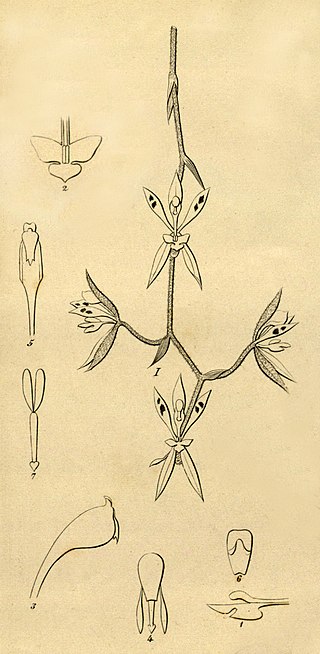
Kegeliella is a genus of orchids native to Mesoamerica, Trinidad, and northern South America.
- Kegeliella atropilosa - Veracruz to Panama
- Kegeliella houtteana - Trinidad, Venezuela, Suriname, French Guiana, Amapá
- Kegeliella kupperi - Costa Rica, Panama, Colombia, Venezuela
- Kegeliella orientalis - Venezuela

Bromelia humilis is a plant species in the genus Bromelia. This species is native to Venezuela, Trinidad & Tobago, and the Netherlands Antilles.

Vriesea procera is a plant species in the genus Vriesea. This species is an epiphyte native to Trinidad and South America.
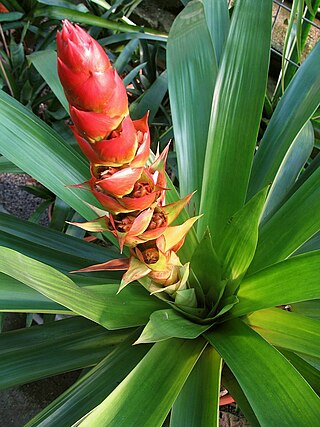
Mezobromelia capituligera is a plant species in the genus Mezobromelia. This species is native to West Indies and northern South America.
Billbergia rosea is a species of flowering plant in the genus Billbergia. This species is native to Venezuela and to the Island of Trinidad.
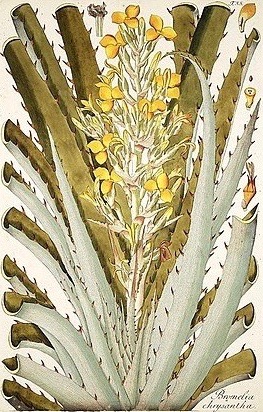
Bromelia chrysantha is a plant species in the genus Bromelia. This species is native to Venezuela, Colombia, and Trinidad & Tobago.

Wallisia anceps is a species of flowering plant in the genus Wallisia. This species is native to Central America, Colombia, Ecuador, Trinidad and Tobago, the Guianas, Venezuela and northern Brazil.

Tillandsia complanata is a species of flowering plant in the genus Tillandsia. This species is native to Bolivia, Peru, northern Brazil, Colombia, Guyana, Costa Rica, Panama, Cuba, Jamaica, Trinidad, Venezuela and Ecuador.
Tillandsia elongata is a species of flowering plant in the genus Tillandsia. It is native to Central America, Yucatán, Jamaica, Trinidad, and northern South America.
Lemeltonia monadelpha is a species of flowering plant in the genus Lemeltonia. This species is native to Trinidad and Tobago, Central America, and northern South America (Colombia, northern Brazil, the Guianas, Venezuela and Ecuador.
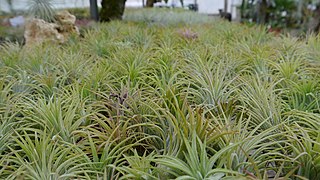
Vriesea rubra is a plant species in the genus Vriesea. This species is native to Trinidad and northern South America.
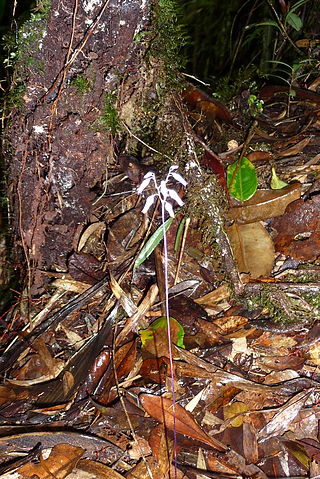
Dictyostega is a genus of flowering plants in the Burmanniaceae, first described as a genus in 1840. It contains only one known species, Dictyostega orobanchoides, native to southern Mexico, Central America, Trinidad, and South America ).
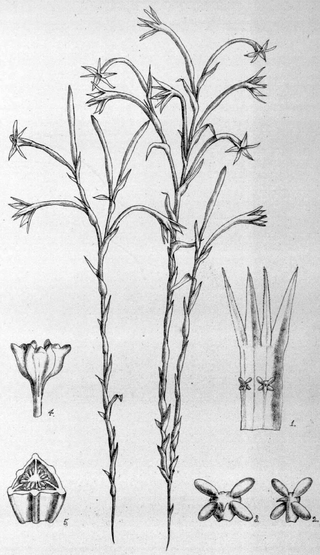
Campylosiphon is a genus of flowering plants in the Burmanniaceae, first described as a genus in 1882. It is native to tropical western and central Africa, as well as northern South America.
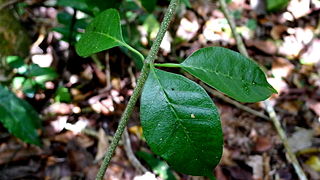
Condylocarpon is a genus of flowering plants in the family Apocynaceae first described as a genus in 1822. It is primarily native to South America, though found also in Trinidad & Tobago and Nicaragua.














